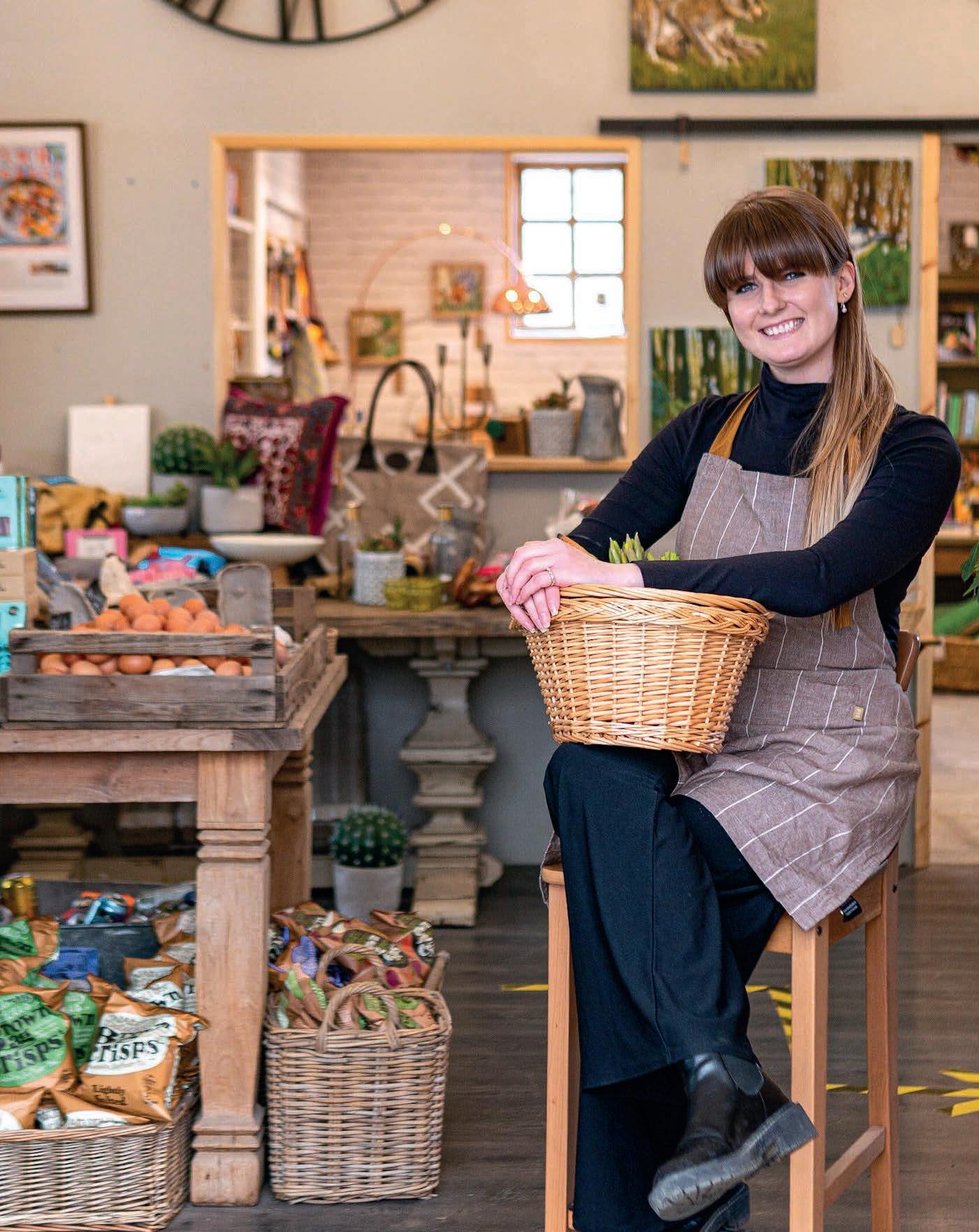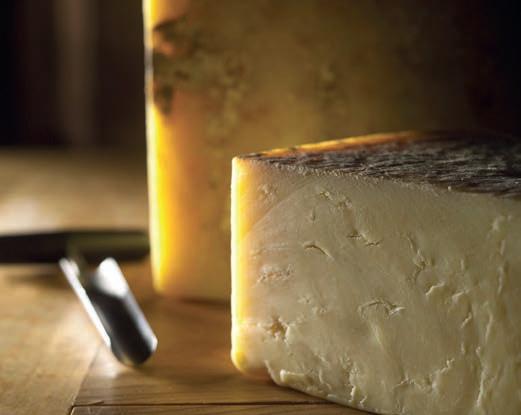
12 minute read
CHEESEWIRE
from FFD April 2021
US export market opening up a er Trump tari s are scrapped
By Patrick McGuigan
Cheesemakers are hoping to boost exports to the US a er the Biden administration agreed to suspend 25% tari s on British cheese, which were imposed by former president Donald Trump.
The tari s were levied on a range of European food and drink products, including cheese, in 2019 as part of a row over subsidies paid to Airbus. But these have now been suspended for four months on British goods a er negotiations between the countries’ respective governments.
The US accounted for around 25% of Quicke’s sales before tari s, but the Devon cheddar-maker has seen sales there fall by 70% in the past year due to tari s and COVID.
“Our American sales were absolutely slaughtered, so this is good news,” said owner Mary Quicke. “COVID is receding, foodservice is making a comeback and the tari is gone, so there is light at the end of the tunnel.”
The US is the UK’s secondlargest dairy export market a er the EU with previously strong demand for British artisan cheese. But cheese exports to the US fell by 30% last year, compared to 2018, according to the Agriculture and Horticulture Development Board, a reduction worth around £12m.
At Singletons in Lancashire, exports to the US account for around 25% of sales. The company managed to grow its business there last year, despite the tari s, thanks to new listings. Head of sales Henry Openshaw said the suspension of levies was positive news, but also made pricing di cult.
“We welcome the removal of any barriers to free trade,” he said. “Lower tari s mean lower prices, which makes British cheese more attractive for US consumers. But a temporary cessation of hostilities leaves us in a quandary. Yoyo-ing prices confuse retailers, who are not all apprised of the wider political and economic circumstances.” He added that he hoped further US-UK negotiations would lead to a permanent deal.
Mary Quicke told FFD that her daughter Jane, who is based in Vancouver, had joined the company to help rebuild sales in the US.
“It’s a very di erent environment there now because of COVID,” she said.
“A lot of the focus has been on supporting American cheesemakers and there’s been a big move to online, so there’s work to be done to get back to where we were.”
Devon cheesemaker Quicke’s is hoping to rebuild its profile in the USA
NEWS IN BRIEF
Tributes were paid across Northern Ireland last month, after the death of Dean Wright, owner of Ballylisk of Armagh. The cheesemaker, who made the mould-ripened cheese Triple Rose on his family farm, passed away suddenly at the age of 48.
Restaurant group Six by Nico has launched a pop-up cheese shop in Glasgow. The Cheese Club Shop will be managed by former George Mewes cheesemonger Stephen Sweet, who will also oversee online sales through the company’s food delivery arm HOME-X.
Arla Foods is consulting with 37 staff over plans to end production at its Trevarrian Creamery in Cornwall, which makes brie and camembert. The company aims to shut down the site by the summer due to losing ownlabel contracts and instability in foodservice caused by COVID.
The British Cheese Weekender – launched last year to help cheesemakers – returns this month with three days of online talks and tastings.
Taking place on 23rd-25th April, the online festival is sponsored by Opies Foods, Tracklements and Peter’s Yard, and aims to raise awareness and boost sales of British artisan cheese. Last year saw more than 30 free online events from leading food writers, cheesemakers and mongers. The festival is backed by the Specialist Cheesemakers Association, the Guild of Fine Food and the Academy of Cheese. blog.academyofcheese.org/british-cheeseweekender
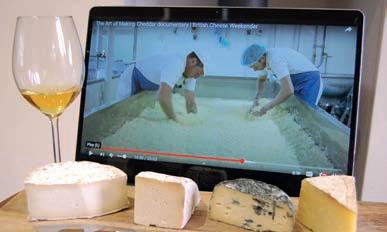
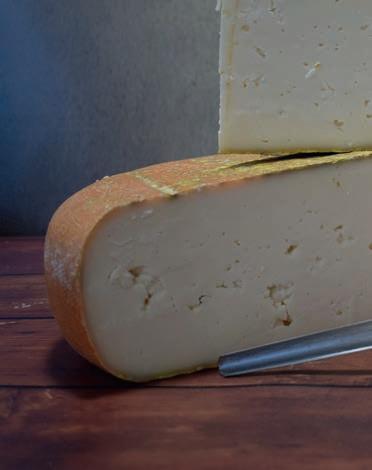
THREE WAYS WITH... Rachael Reserva
Somerset-based White Lake’s washedrind goats’ cheese Rachel has an older sister with a big personality. Rachael Reserva (it’s spelled differently because it’s named after a different person) is made in larger 12kg wheels and is aged for at least 12 months, rather than 3, to create a cheese with a much bolder, intense flavour. The texture is pliable with a powerful fruity, nutty and umami flavour.
Sweet chilli sauce There’s a big tropical fruit hit in Rachael Reserva and a spicy tingle at the finish, which means it can handle a punchy condiment. Step forward sweet chilli sauce. The fragrant heat and sweet fruity flavour meld nicely with the cheese, while the red sauce against the pale cheese looks good too.
Palo Cortado sherry Sweet hazelnut notes abound in the cheese, so sherry is a natural choice. Palo Cortado, which is halfway between an Amontillado and an Oloroso, is just the ticket. It has plenty of acidity and nutty tones, but also a rich, mouthcoating sweetness.
Pizza If pineapple on a pizza is your thing, then you might want to give Rachael Reserva a go instead. The cheese melts beautifully and has a distinct pineapple flavour, which complements salty toppings, such as ham and olives. Think of it as a West Country Hawaiian.
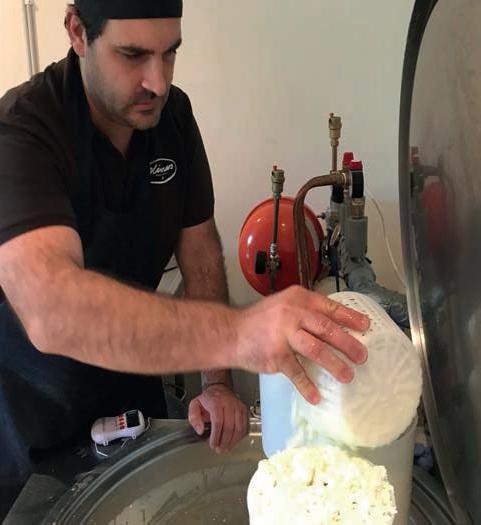
Yorkshire Pecorino to double its output with switch to new dairy
By Patrick McGuigan
Yorkshire Pecorino, which makes a range of sheep’s milk cheeses in Leeds, plans to more than double capacity when it moves to new premises in Otley.
The new 1,200 sq site will house a new 500-litre vat, which will be used alongside the company’s existing 300-litre vat, plus much larger maturation fridges and a dedicated packing area. There is also potential to take over a shop unit at the site in the future to sell direct to the public.
Cheesemaker Mario Olianas told FFD he was con dent that there was still untapped demand for his cheeses despite the uncertainty caused by the pandemic.
“As we return to normality, I have to grab this opportunity to move forward,” said Olianas, who is originally from Sardinia in Italy and runs the business with his partner Sonia. “We’ve reached capacity where we are now, so this is de nitely the right time to grow. We do the farmers’ market at Otley and have a really good customer base.”
Olianas currently makes cheese at his house in Adel, part of which has been converted into a dairy but hopes to start making cheese at the new site this month.
The cheesemaker is best known for Leeds Blue, Yorkshire Ricotta and Yorkshire Pecorino, but said the move will allow him to focus on other products, such as a new halloumi-style sheep’s milk cheese, and an aged Pecorino Fiore cheese.
“It will also mean we can move into supplying wholesalers,” he said. “We haven’t scratched the surface yet.”
Volumes of Yorkshire Pecorino will increase once Mario Olianas moves production to a unit on the outskirts of Leeds
BEHIND THE COUNTER TIPS OF THE TRADE
Harry Baines, Love Cheese, York
Online cheese tastings have become a feature of the pandemic, but York cheesemonger Harry Baines was one of the first retailers to see their potential.
The owner of Love Cheese launched his first online event last April and has seen demand boom to the point that he and his wife Phoebe now host 90-minute tastings for as many as 400 households every other week.
“It’s exploded as people invite their friends and family all around the country,” says Baines. “We’ve changed from being a cheesemonger to an events company.”
The £50 tasting packs contain five 75g pieces of cheese and five wines decanted into small glass tonic bottles, which are separated by cardboard dividers. They are delivered by DPD. “We tried most of the major couriers and they have the lowest cock-up rate,” says Baines.
He adds that Facebook Live works well because it can handle big numbers and recordings are kept on the home page.
“Online tastings will continue to be popular as we come out of lockdown,” he says. “People still want to keep in touch with family.”
CHEESE IN PROFILE with
Cote Hill Blue
What’s the story?
The Davenport family has been cheesemaking on their farm in Market Rasen, Lincolnshire, since 2004. Mary and Michael diversified into cheesemaking when wholesale milk prices started to fall. Their sons Ross and Joe now both work in the business, tending to their small herd of Friesian Holstein cows and some more recently introduced brown swiss – as well as making cheese.
The Davenports are all committed to their ethos of contented cows grazing on quality pastures produce amazing milk and, combined with expert cheesemaking skills, greattasting cheese is created.
How is it made?
The fresh morning milk is taken from the milking parlour across to the cheese rooms where the cheesemaking begins.
No pasteurisation takes place, the milk comes in at 34°C and is cooled down to 32°C, before the starter culture and Penicillium roqueforti mould is added. The resulting curds are cut into large pieces and gently hand-ladled into the moulds. The cheeses are salted using a dry rubbing technique and then moved to the maturation rooms.
The outer moulds begin to develop before piercing takes place to create the network of internal blue veins.
Appearance & texture:
Cote Hill Blue was born out of Michael Davenport’s love of Continental blues such as Cambozola and Gorgonzola. Over the years, it has developed its own unique personality and, in turn, won multiple awards. This soft blue, with a natural, edible rind is mild and slightly chalky at four weeks old. As it matures, the centre turns into a smooth, creamy, gooey texture and at 12 weeks the cheese has a peppery blue bite.
Variations:
There are two sizes available, a 330g baby and the larger 1.2kg cutting cheese.
Cheesemonger tip:
Promote it as a British alternative to Cambozola. It’s great for a light lunch served on toasted sourdough bread with dried fruits and walnuts.
Chef’s recommendation:
It’s superb on the cheese board with walnuts, or chefs could create a filo pastry tart with Cote Hill Blue, roughly chopped cooked chestnuts and sliced pears, dressed with rocket leaves. Serve with a Pinot Noir.
While traditional classroom courses are suspended due to the COVID-19, delegates can still sign up to Academy of Cheese Level 1 & 2 courses online as self-study eLearning, or interactive virtual classroom courses. academyofcheese.org
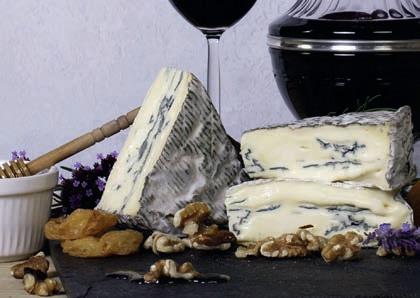
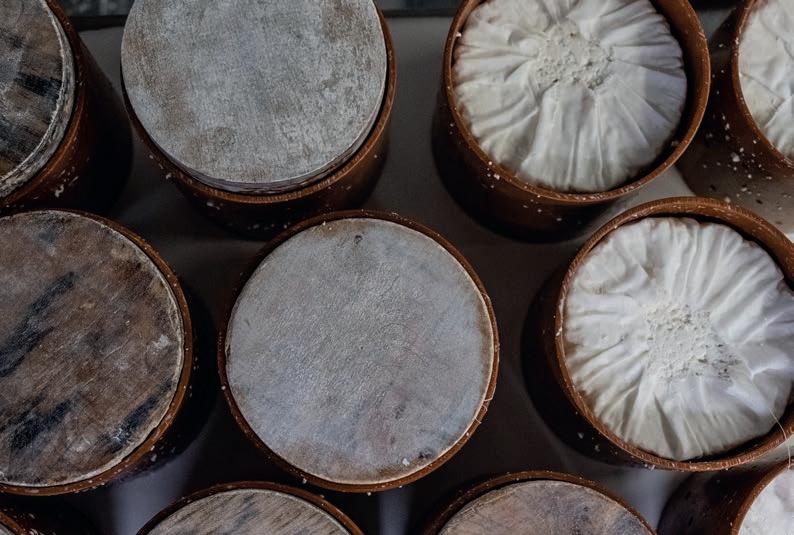
Way out North West
In business since 1979, Cumbriabased Thornby Moor Dairy has survived the pandemic despite its very remote location.
By Patrick McGuigan
IF YOU AREN’T FAMILIAR with where Thornby Moor Dairy is, you’d be forgiven. “We’re close to Carlisle in the bit of Cumbria that nobody ever comes to,” says director Leonie Fairbairn wryly. “It’s two hours to Manchester, Glasgow or Newcastle, so geographically we’re out on a limb.”
Based on the old Cro on Hall Estate on the Solway Plain, which stretches from north-west Cumbria over the border into Scotland, the dairy is certainly a long way from famous Lake District destinations, like Windermere and Coniston.
Thornby Moor has been making cheese in the area since 1979 and while its remote setting is beautiful, it has made navigating lockdowns di cult. Around 80% of sales go to hotels and restaurants, mainly in Cumbria, while local delis and farm shops are thin on the ground.
“There are very few deli counters in North Cumbria and the population is small,” says Fairbairn, who runs the business with her mother Carolyn. “There are under 500,000 residents in the whole county and to get to the next village or town is o en a 40-mile round trip, so it was di cult for us to reach our customer base. We couldn’t do house-to-house deliveries during lockdowns as some cheesemakers did.”
Sales in the past year have su ered, but the company has managed to get through the worst of it, thanks to a combination of the furlough scheme and an understanding landlord – allied to the reopening of restaurants last summer and a relatively normal Christmas.
Cheesemaking has continued throughout the ups and downs, albeit at a reduced rate, with the dairy juggling production to take less cows’ milk to focus more on goats’ cheeses.
“We can take or leave the cows’ milk because there are other markets for it, but goat’s milk is di erent. If we don’t buy from our farms, it puts them at risk because there is nowhere else for the milk to go. It’s a precarious business.”
Fairbairn’s mother Carolyn understands this better than most. She set up the business using milk from her own herd of goats to make cheese in the basement of the family home before the company moved to its current site in 1994, when Leonie joined full-time. Carolyn continues to make cheese, working six days a week during the pandemic at the venerable age of 78.
While the past year has been tough, Thornby Moor’s long history has helped put things into perspective. “It’s not the rst crisis we’ve been through in 40 years,” says Leonie Fairbairn. “In 2001, this area was at the heart of footand-mouth and in 2015 Storm Desmond hit just before Christmas and wiped out our main delivery route.”
The pandemic has also opened new doors. Sales through the dairy’s website have been an important source of income, while Fairbairn has also been more active on social media, making new connections and taking part in an online debate and podcast.
With restrictions on hotels and restaurants set to be li ed, and foreign holidays looking unlikely for a while yet, the coming months could be good ones for the local area.
“Cumbria will bounce back,” says Fairbairn. “We know people will come and the car parks will be full. But we also saw a di erent sort of tourist here last summer. People have been exploring more during the pandemic and have found the Solway Plain for the rst time.”
It could add up to a bumper summer for Cumbria, even in the bit that nobody normally goes to.
thornbymoordairy.co.uk
If we don’t buy from goat farms, there is nowhere else for the milk to go.

CROSS SECTION
Allerdale
1
Thornby Moor makes a range of unpasteurised cows’ and goats’ milk cheeses, but is arguably best known for Allerdale, which was the first cheese ever made by Carolyn Fairbairn. It’s made with raw goats’ milk and kids’ rennet in a similar way to cheddar (the curds are piled in the vat before being milled and salted). The 2kg, cloth-bound cheeses are aged for around five months.
Milk for Allerdale comes from two local suppliers: Dolken Dairy Goats and a farm near Penrith. Thornby Moor sold its goats in the 1990s, but many of the animals milked by its suppliers today can trace their lineage back to that original herd. The cheese has a close, relatively moist texture with small openings, while the flavour is sweet and almondy with earthy, savoury notes, plus a juicy acidity.
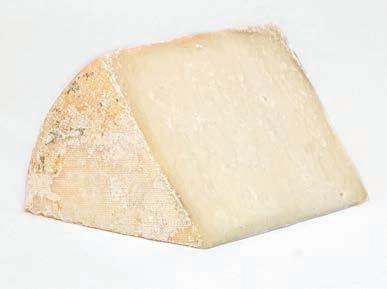
2






